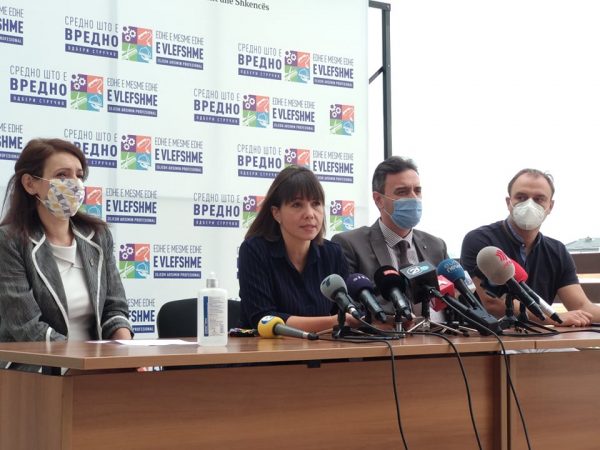As the new 2020/2021 school year officially starts tomorrow, it is a process that can be successful if we all join forces since there will be myriad challenges. It’s key that there’s continuity, Minister of Education and Science Mila Carovska said Wednesday.
The conditions in these unprecedented times, she said, should not be viewed only as challenge and obstacle, but also as an opportunity to modernize the education system quickly.
“The challenge in this short period of time wasn’t easy and it’ll never be easy, but we don’t run away from the challenges, we address them to overcome them as quickly as possible. This year will be very different,” Carovska told a news conference.
Cooperation, she noted, should be established between parents, students and teachers and between teachers and mayors and experts in order the cooperation to make it possible that we have a successful school year.
The Minister urged for calm and patience ahead of the start of the new school year. “Changes are difficult, but digitization is a blessing for our society. Even when the pandemic is over, our teachers will have digital skills,” she stressed.
I see no reason why the school year should not be successful, Carovska noted.
Referring to the National Online Learning Platform, she said yesterday’s test of the Microsoft Teams system proved successful. “The students will be in classes according to the plan. Classes will be held online as planned as the remaining modules of the platform are being optimized.”
“The children who don’t have the necessary equipment, computers, or who cannot log-in for online classes, they can be part of in-person learning. If they are unable to be in classrooms, for example if their parents decided against in-person learning, then all students will be provided with the needed materials to study at home. Also lectures will be recorded to be aired on TV,” said Minister Carovska, admitting: “Perhaps it’s not the ideal solution, but it covers all students to be able to attend classes in some form.”
Out of a total of 864, nearly 600 elementary and secondary schools have been permitted to organize in-person learning.
Asked for a comment on the high school students demanding blended learning in schools, Carovska said the plan for the 2020/2021 school year had been already closed. “This is not a wishing well, this situation is real and we must follow the recommendations of health authorities,” she told the news conference.
According to Deputy Education Minister Arafat Shabani, the National Online Learning Platform, although designed in complex circumstances, had accelerated the ‘much-needed digital transition of the education system.’
“To design and develop an online functioning solution, used by 26,000 teachers to teach over 250,000 students in over 1,000 schools is a complex and dynamic process, too ambitious at times. But, we’ve managed in a very short time to design a system and lay the foundations for implementation at the start of the new school year,” stated Aleksandra Ruzhin, coordinator for development of the national platform for distance learning.
The platform was designed and put into service by the Faculty of Computer Science & Engineering (FINKI).















